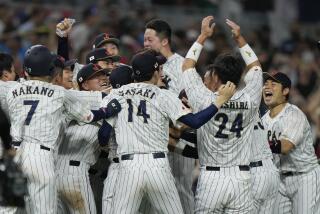No Doubt About Who’s Best After Cuba Takes Gold
- Share via
ATLANTA — Cuba’s dominance in international baseball, so recently in question, is once again official.
With an awesome display of power Friday night led by third baseman Omar Linares’ three home runs and six runs batted in, Cuba defeated Japan, 13-9, repeating as Olympic champion despite the defection of its best pitcher to the United States shortly before the Olympics.
In a tournament that will be remembered for the long ball, Cuba hit eight home runs in the final game, 38 total.
Orestes Kindelan, Cuba’s designated hitter, set an Olympic record with nine home runs in the tournament. Linares hit eight homers, driving out three pitches in four at-bats Friday.
“It was a very tough tournament and championship, with rivals with an incredible amount of skill,” Cuban Manager Jorge Fuentes said.
Though the game lacked the buildup of the anticipated U.S.-Cuba gold-medal game, Japan seemed to be an opponent that might give the Cubans some difficulty.
The Japanese had defeated the United States, 11-2, in a semifinal game, and stretched Cuba to 10 innings in an early round game before losing, 8-7.
Katsuji Kawashima, the Japanese manager, is being second-guessed in several languages today after starting the same pitcher Friday against Cuba that he did Thursday against the United States.
“It is simple. He is our best pitcher, and this was our most important game of the competition,” Kawashima said.
Masanori Sugiura went 5 2/3 innings against the Americans. Sent back to the mound 24 hours later, he lasted only 1 2/3 innings, giving up five runs.
“I was a little tired,” said Sugiura, who pitched in relief in consecutive games in the 1992 Olympics. “I didn’t really ask to start, but I believed I would pitch today so it didn’t matter if it was the beginning or the end of the game.”
The second batter Sugiura faced, Luis Ulacia, doubled. The third and fourth, Linares and Kindelan, hit home runs.
Sugiura got two outs in the second inning before he gave up a run-scoring double to Jose Estrada. Sugiura was finished, and before the inning was over, the score was 6-0.
Just when it seemed Cuba might be able to impose the 10-run “mercy” rule and end the game early, Japan rallied.
When first baseman Nobuhiko Matsunaka stepped to the plate in the fifth with the bases loaded and Japan trailing, 6-2, it still seemed unimaginable that the Cubans would face a threat.
But Matsunaka drove Omar Luis’ 1-1 pitch over the wall in left-center, and his grand slam tied the score, 6-6.
Cuba ended the suspense in the sixth, when left fielder Miguel Caldes and shortstop Eduardo Paret hit solo homers and Linares drove in two runs with his second home run of the game, a line drive over the right-field wall.
That made the score 10-6, and it was 13-7 before Yoshitomo Tani’s two-run homer in the ninth.
Linares is one of Cuba’s most loyal players, saying he would never defect for a chance to play in the major leagues as others have, most recently pitcher Rolando Arrojo.
“Even if I don’t play in the major leagues, I would still feel I’ve had a very satisfying career,” he said.
Whether this will mark the end of an era in Olympic baseball remains to be seen, but it is likely professionals will participate in 2000.
“I think I cannot assure Cuba will win the gold medal next Olympics if pros play,” Fuentes said. “We will have to play and practice long and hard.”
(BEGIN TEXT OF INFOBOX / INFOGRAPHIC)
MEDALISTS / Baseball
GOLD: Cuba
SILVER: Japan
BRONZE: United States
More to Read
Go beyond the scoreboard
Get the latest on L.A.'s teams in the daily Sports Report newsletter.
You may occasionally receive promotional content from the Los Angeles Times.







